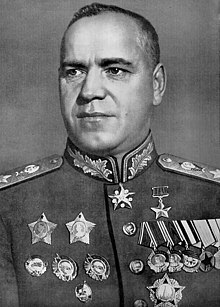Marshal Zhukov
| Georgy Zhukov | |
|---|---|
| Гео́ргий Жу́ков | |

Zhukov in 1944
|
|
| Minister of Defence | |
|
In office 9 February 1955 – 26 October 1957 |
|
| Premier | Nikolai Bulganin |
| Preceded by | Nikolai Bulganin |
| Succeeded by | Rodion Malinovsky |
| Full member of the 20th Politburo | |
|
In office 29 June – 29 October 1957 |
|
| Candidate member of the 20th Politburo | |
|
In office 27 February 1956 – 29 June 1957 |
|
| Personal details | |
| Born |
Georgy Konstantinovich Zhukov (Гео́ргий Константи́нович Жу́ков) 1 December 1896 Strelkovka, Kaluga Governorate, Russian Empire |
| Died | 18 June 1974 (aged 77) Moscow, Russian SFSR, Soviet Union |
| Nationality |
|
| Political party | Communist Party of the Soviet Union |
| Spouse(s) | Alexandra Dievna Zuikova (1920–1953) Galina Alexandrovna Semyonova (1965–1974) |
| Children |
Era Zhukova (born 1928) |
| Profession | Soldier |
| Awards |
|
| Signature |  |
| Military service | |
| Allegiance |
|
| Service/branch |
Russian Imperial Army Soviet Army |
| Years of service | 1915–1957 |
| Rank | Marshal of the Soviet Union |
| Commands |
Kiev Military District Chief of the General Staff Reserve Front Leningrad Front Western Front 1st Belorussian Front Odessa Military District |
| Battles/wars |
World War I Russian Civil War Soviet–Japanese Border War (Battles of Khalkhin Gol) Soviet occupation of Bessarabia and Northern Bukovina Great Patriotic War |
Era Zhukova (born 1928)
Margarita Zhukova (1929–2011)
Ella Zhukova (1937–2010)
Georgy Konstantinovich Zhukov (Russian: Гео́ргий Константи́нович Жу́ков; IPA: [ɡʲɪˈorgʲɪj kənstɐnˈtʲinəvʲɪtɕ ˈʐukəf]; 1 December [O.S. 19 November] 1896 – 18 June 1974), was a Soviet-Russian officer in the Red Army of the Soviet Union who became Chief of General Staff, Deputy Commander-in-Chief, Minister of Defence and a member of the Politburo. During World War II he participated in multiple battles, ultimately commanding the 1st Belorussian Front in the Battle of Berlin, which resulted in the defeat of Nazi Germany, and the end of the War in Europe
In recognition of Zhukov's role in World War II, he was allowed to participate in signing the German Instrument of Surrender and to inspect the Moscow Victory Parade of 1945.
...
Wikipedia
